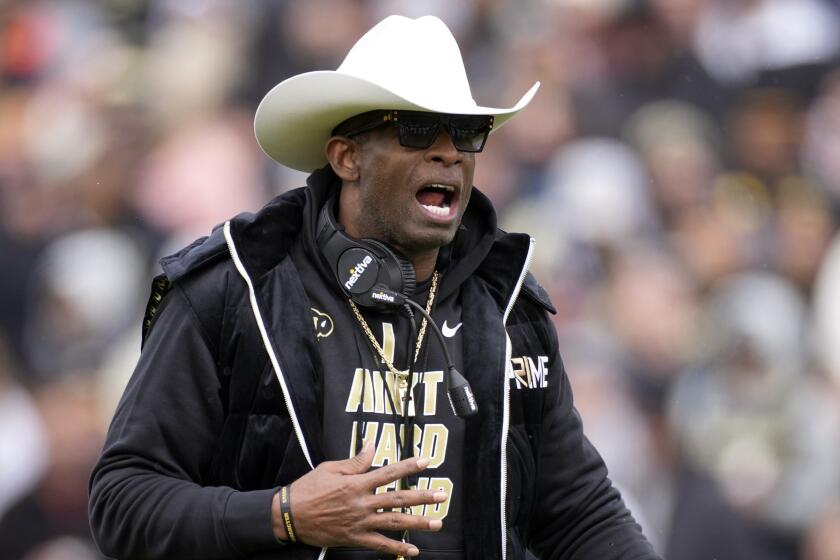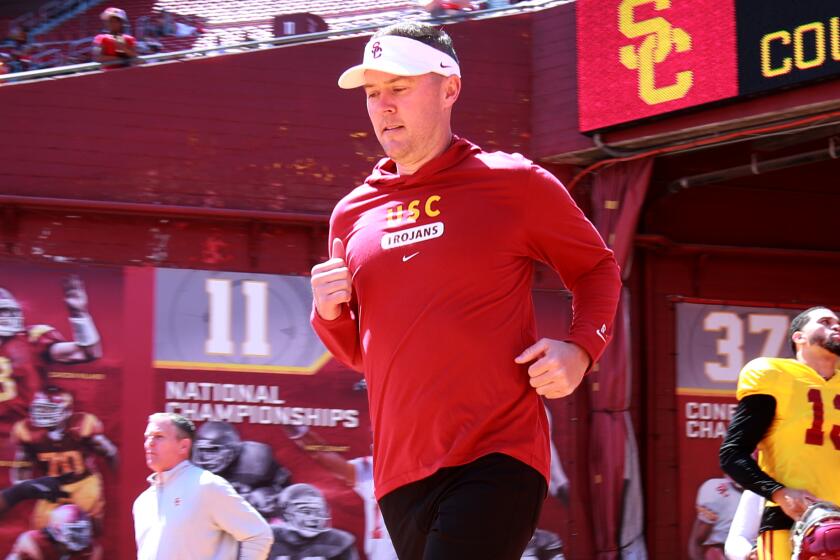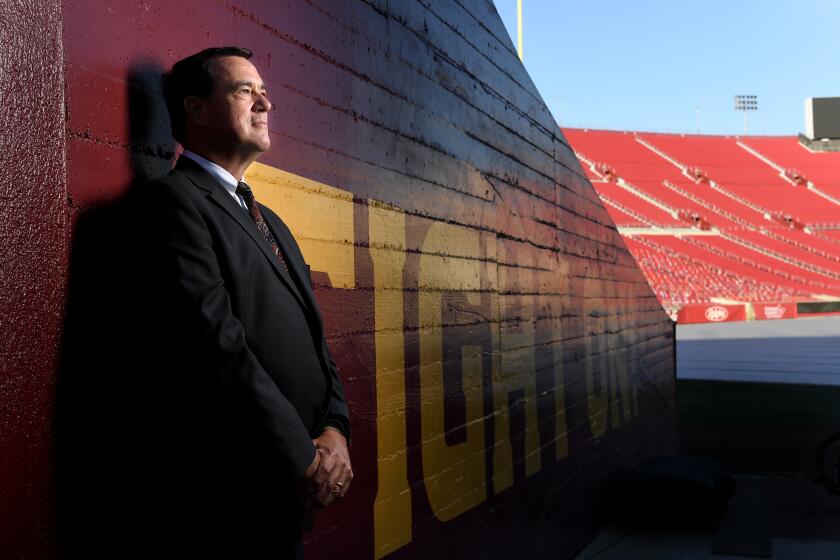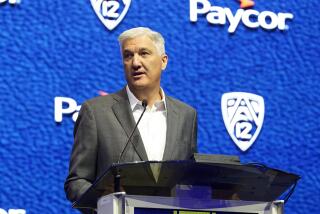George Kliavkoff and the new Pac-9 learn a hard lesson. Universities follow the money
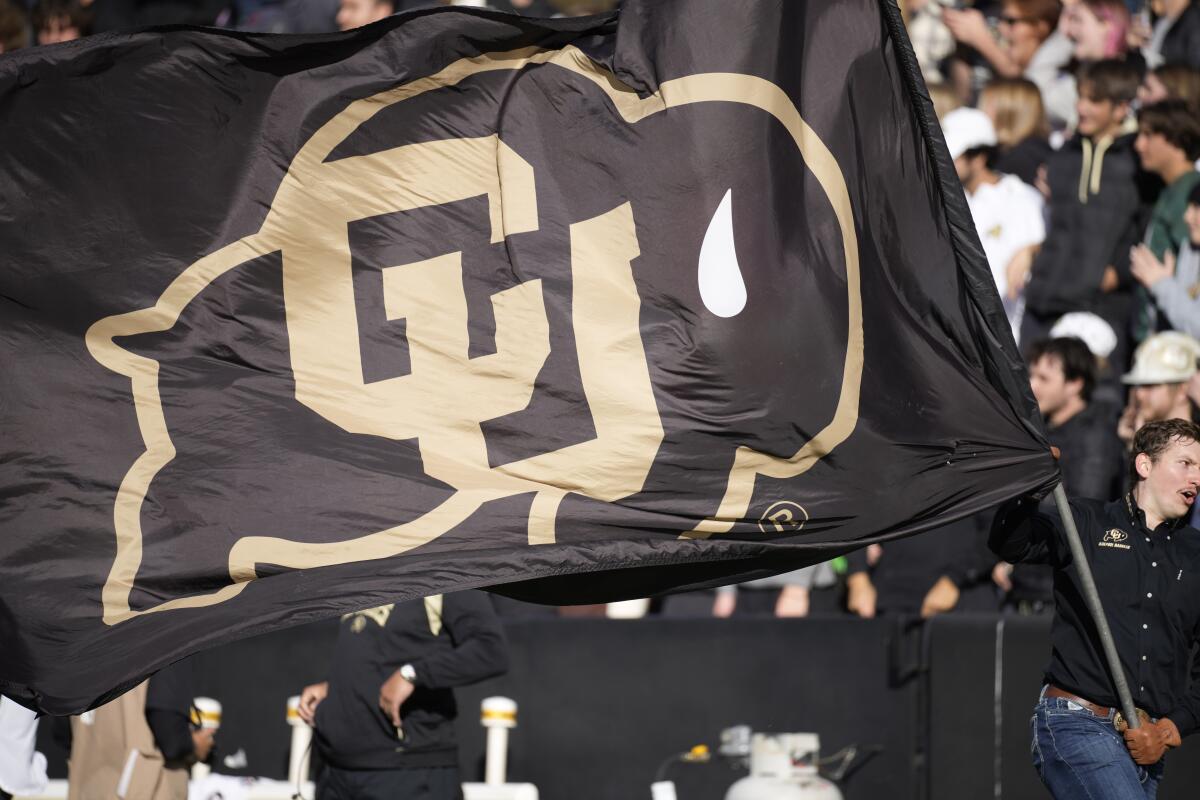
- Share via
Last week at Pac-12 media day, league commissioner George Kliavkoff did something that looks even more ridiculous in retrospect. Speaking from the stage, he said he chose not to announce a new media rights deal for the conference at the event so that the focus could be on football.
Naturally, he was then asked to clarify: Was he saying the Pac-12 had an agreement in place after a year of waiting?
“I think you’re reading too much into that,” Kliavkoff said.
Clearly.
Clearly, Kliavkoff had nothing of substance in his back pocket. Colorado knew it, and most of us gathered in the room assumed it.
News leaked Wednesday that the Buffaloes are planning to stampede right on back to their Big Eight/Big 12 roots. Thursday, the school made it official.
Colorado is leaving the Pac-12 after the university’s board of regents voted 9-0 in a special meeting to approve a switch back to the Big 12.
The Pac-12 is now a Pac-9. During the coming days and weeks, that number is sure to change. Whether it will grow or decrease remains to be seen.
Maybe I will use the conference’s predicament to teach my 5-year-old daughter basic math. And maybe someday I’ll have to tell her the story of why our beloved coast has no major college sports conference to speak of — why Los Angeles’ most prestigious universities had to pal up with a collection of schools nestled around America’s Great Lakes to give Southern Californians something meaningful to cheer for on fall Saturdays.
I would start the story with a personal touch. In June 2010, I covered Kansas and the Big 12 for the Kansas City Star when there was real fear Pac-12 commissioner Larry Scott was on the verge of convincing Texas, Oklahoma, Oklahoma State and Texas Tech to join the Pac-12. This move would have crushed the Big 12, leaving Kansas and others scrambling. Political pressures, combined with the Big 12 kowtowing to Bevo, saved the league and kept the surprisingly assertive Pac-12 at bay.
Looking back, it’s easy to second-guess and say Scott should have given Texas whatever it wanted to come west. But the Pac-12 presidents aren’t plunderers by nature. They mostly accepted the status quo by adding Colorado from the Big 12 and Utah from the Mountain West instead.
After all, the Pac-12 already had a blue-blood football powerhouse that won more than any other during the 2010s. But at the exact time that Scott was trying to lure the Longhorns, the NCAA hit USC football with sanctions from the Reggie Bush scandal.
Texas’ decision to stay put and the NCAA’s decision to cripple the Trojans left the Pac-12 without a strong football brand to carry the conference and its ill-conceived Pac-12 Network.
Nobody could have predicted just how badly Scott miscalculated the conference owning all of its third-tier broadcast rights. Nobody could have imagined, given the Pac-12’s history and prestigious brands, that Scott wouldn’t be able to get the network a respectable level of distribution. Few could have known that so many household cable cords would be cut across the country by the end of the Pac-12’s media rights deal.
Kliavkoff was hired to clean up Scott’s mess. Like Scott, he had no experience in college sports, but he seemed like the type of guy who could adapt quickly. At the very least, he came off likable, a potential consensus builder.
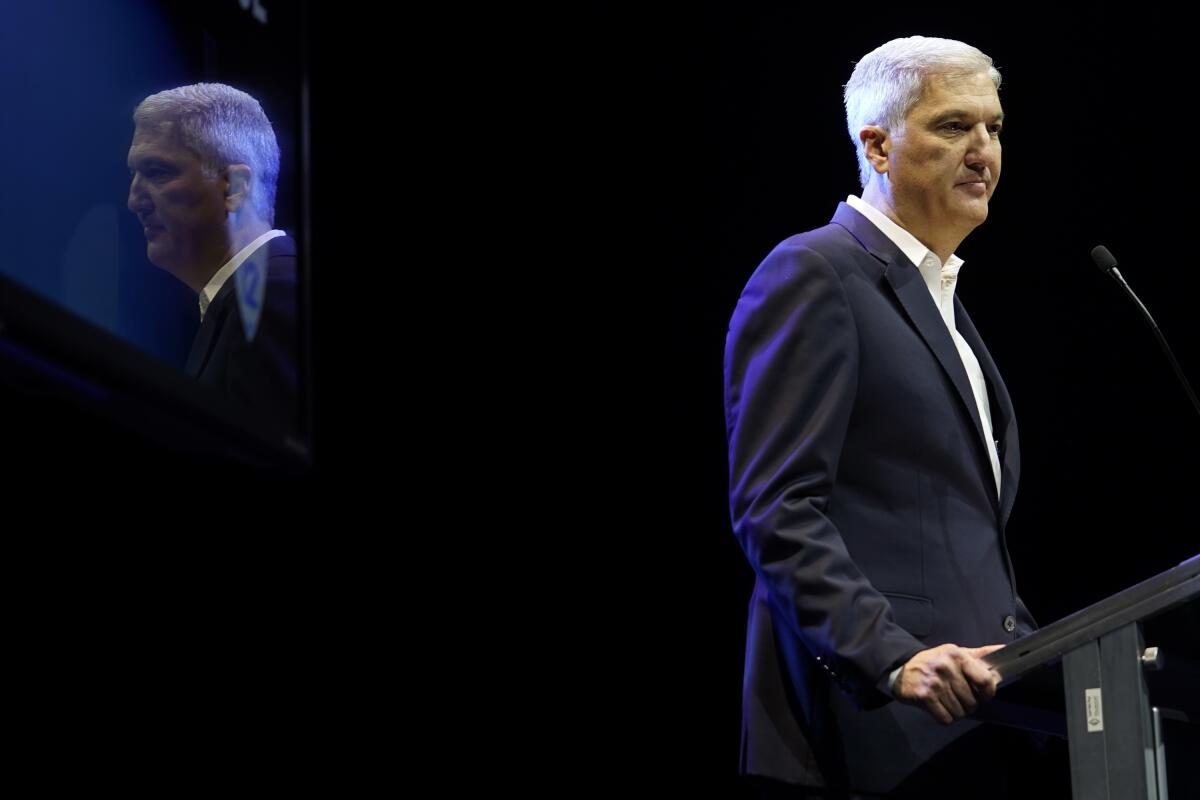
He told me that he thrived on solving complex puzzles, and, sure enough, he had one on his hands within the first few months on the job when Texas and Oklahoma left the Big 12 for the SEC.
Suddenly, the Big 12 was on its deathbed, as many thought it had been a decade earlier. The remaining eight schools were not going to bring appeal for the SEC or Big Ten, so they were practically begging Kliavkoff for entry into the Pac-12.
Kliavkoff spent that first summer kissing the ring of USC. He was hoping to make President Carol Folt and athletic director Mike Bohn comfortable with the long-term direction of the league with him in charge so that the Trojans wouldn’t go seeking a more desirable home as Texas and Oklahoma did.
While trying to cozy up to USC, Kliavkoff also narrowed down a list of Big 12 schools that he felt could add value to the conference as it pursued its next media rights deal. But when Kliavkoff brought the idea to the presidents, Folt expressed disdain at the idea of expanding. The rest of the group followed suit, because keeping USC happy was more important than adding, say, a school like Texas Christian, Texas Tech or Baylor, to strengthen the conference’s foothold and get into the fertile Lone Star State recruiting hotbed.
Of course, a year later, USC and UCLA were out the door to the Big Ten.
Folt played Kliavkoff, who learned the hard way that higher education is a business just like any other. Universities will always follow the money.
Without the L.A. schools as a part of the Pac-12’s content offering, Kliavkoff was always going to have to pull a rabbit out of the hat in this round of media rights negotiations.
Entering Year 2 of his USC coaching tenure, Lincoln Riley says college football needs the Trojans to be a national power and elevate the West Coast.
The Big 12’s new commissioner, Brett Yormark, had no college sports experience, either. But he quickly jumped Kliavkoff in line with ESPN and Fox, re-upping with the college sports broadcast kingpins.
How much money would the networks have left for this iteration of the Pac-12? Not much.
So, here we are. Colorado is gone. The Pac-12 spin will be that the Buffs aren’t a big loss due to the poor state of their football program, that they can be easily replaced, but it’s more about the symbolism than the school.
Kliavkoff can’t save the Pac-12 from its oncoming demise. The numbers he brings for a TV deal won’t be good enough on their own.
Should USC and search firm Turnkey have known about Mike Bohn misconduct allegations at Cincinnati? College sports and search firm insiders weigh in.
Only Oregon and Washington can save the league from becoming the equivalent of a “Group of Five” conference. If the Ducks and Huskies are content to make less money but take advantage of an easier path for automatic College Football Playoff berths, then the Pac-12 will survive.
If they’d rather pray for a Big Ten invite (which probably won’t come) in a rejuvenated conference with leaders who are not afraid to fight for their future, then they’ll head for the Big 12, too.
Kliavkoff has proved to be overmatched to this point, but he will take more blame than he should. This falls on his bosses and their predecessors, the presidents and chancellors who have repeatedly acted toward big-time college athletics in a way the rest of the country would expect of the institutions that represent the West Coast ethos.
They have been passive. They have been elitist. They have thumbed their noses at the pursuit of football success. And they are on the verge of making what was once a tired cliche seem all too true: On Saturdays out west, there are simply better things to do.
More to Read
Go beyond the scoreboard
Get the latest on L.A.'s teams in the daily Sports Report newsletter.
You may occasionally receive promotional content from the Los Angeles Times.

